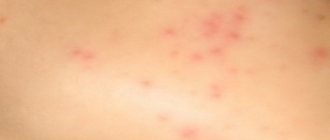Author of the article
Vereshchak Vladimir Vasilievich
Otolaryngologist (ENT) of the first category
Articles written
704
about the author
Allergies to vitamins are diseases of the immune system. The body shows hypersensitivity to components that previously benefited it.
There are two types of reactions to vitamins: food and contact. The first type occurs due to the consumption of products containing the pathogen. For example, cases of allergies to vitamin C, which is found in citrus fruits, are not uncommon. The contact type of pathology provokes contact with the skin of products containing a pathogen. For example, symptoms of irritation may occur after using certain ointments and creams.
Particularly useful substances
Vitamins are constantly needed. They are not synthesized in the body and come from food. The functions of vitamins are very diverse:
- support metabolism,
- participate in chemical reactions,
- promotes the removal of toxic substances,
- protect against many diseases,
- help the functioning of internal organs,
- reduce inflammatory processes,
- slow down the aging process,
- improve cognitive abilities (memory, thinking, attention),
- take part in the process of formation of bone and cartilage tissue,
- strengthen the immune system.
Benefit
With the help of ascorbic acid you can protect your body from flu and colds. In addition, the substance helps to quickly heal wounds. Vitamin C is also involved in the production of collagen. Thanks to ascorbic acid, the healthy condition of teeth, bones, cartilage is maintained, and iron is better absorbed.
If there is not enough vitamin C, iron is poorly absorbed. Subsequently, scurvy, anemia, and serious digestive disorders develop. Therefore, it is important to monitor the amount of this component in the body. If the dosage is increased, it will end in an overdose.
Vitamin allergy
With a balanced diet, a person receives all the necessary vitamins in natural form. If he has vitamin deficiency, he is prescribed certain vitamins. Many people buy vitamins in pharmacies on their own without consulting a doctor, because they are sold without prescriptions. With uncontrolled use of these drugs, there is a risk of overdose, poisoning and allergies.
Symptoms of vitamin intolerance
Allergic reactions to vitamins are similar to food irritations. It is easy to confuse pathologies, so you cannot make a diagnosis yourself; you should consult a doctor. Main features:
- frequent sneezing,
- redness, skin rash,
- general weakness,
- vomit,
- severe itching on the skin,
- migraine,
- increased heart rate,
- attacks of nausea,
- bags under the eyes,
- colic in the stomach,
- accumulation of intestinal gases,
- indigestion of food in the form of diarrhea or constipation.
What should you pay attention to?
The first sign that you need to give up ascorbic acid are the following signals:
- The rash is very itchy.
- Blisters appear.
- The skin turns red and swells.
- A runny nose, cough, increased lacrimation, and red eyes appear.
- Quincke's edema is observed.
- Symptoms of anaphylactic shock occur.
To get rid of unpleasant symptoms, first of all you need to give up foods that contain vitamin C; also carefully read the instructions for the drug.
Causes of allergies to vitamins
Certain reasons can affect the occurrence of an allergic reaction in the body:
- heredity,
- frequent infectious diseases,
- polluted external environment,
- abuse of vitamins or certain foods (mushrooms, caviar, eggs),
- diseases of the digestive system,
- lack of opportunities for the development of immunity due to sterile conditions in childhood,
- constant stress,
- excessive intake of some vitamins into the body.
Causes
As you know, in modern society, allergies are becoming an increasingly common pathology, and even ordinary vitamins can become provoking factors. They can cause an allergic reaction if certain predisposing conditions are present, which include the following:
- Hereditary predisposition. If close relatives, especially parents, have a history of indications of individual sensitivity to any vitamins, then the likelihood of similar manifestations in children is high (up to 80%).
- Existing allergies. Very often, if a person has a food, household, pollen, drug or contact allergy, it is possible that vitamins can also cause a similar reaction. In this regard, allergy sufferers are subject to careful monitoring while taking any new drug, including vitamin ones.
- Disturbances in the functioning of the immune system. This includes both immunodeficiency conditions (congenital and acquired) and autoimmune conditions. In both cases, the cells of the immune system cannot adequately evaluate the antigens entering the body and often react to them hyperactively, which provokes allergies.
- A special group should include cancer patients who, due to their treatment, are forced to be in sterile conditions. Their immune system is so depressed that it is unable to fight pathogens, while substances “familiar” to the body, such as vitamins, can cause autoaggression and allergies.
- Existing chronic diseases. This may include insufficiency of liver and kidney function, as well as pathologies of the gastrointestinal tract. All of them affect the state of the body’s immunological defense.
- Overdose of vitamins. The intake of a large dose of drugs can cause clinical manifestations similar to those of a common allergy. However, in this case, the pathology will be called pseudoallergy, since all the biochemical processes that occur during a true allergic reaction do not occur.
- Taking a large number of medications at the same time. There may be undesirable interactions of some vitamins with other medications or with each other, which can trigger allergies.
- Recent severe infectious diseases.
Based on the above reasons, vitamins with a history of allergies should be prescribed with great caution to avoid unpleasant consequences for the patient.
Features of allergies in children
In childhood, vitamin intolerance resembles a food allergy. Frequent manifestations in children:
- diaper rash,
- constant regurgitation,
- diarrhea or constipation for no apparent reason,
- weeping diathesis,
- refusal of food,
- eczema,
- redness, rashes, itching on the skin,
- runny nose without a cold,
- convulsions,
- faster overgrowth of the fontanelle,
- coughing.

Manifestations of allergies in adults
It is wrong to believe that vitamin intolerance occurs only in childhood. Even a strong immune system is not always able to cope with such a problem. Most often, in adults, the nasopharynx is primarily affected. When blood flow increases, the sinuses swell, making it difficult for a person to breathe. There is no runny nose or other cold symptoms. Due to constant nasal congestion, headaches begin, followed by general weakness and sleep disturbances.

Side effects
The body cannot constantly maintain a constant concentration of vitamin C. For it to function normally, ascorbic acid must be supplied regularly. The excess is excreted in the urine.
If the dosage is observed, there are no side effects. If you do not follow the instructions, you will end up with a severe allergy with rashes, itching, and hypervitaminosis.
When a person takes a large dose of vitamin C, it can result in vomiting, nausea, drowsiness, headache, digestive upset, intestinal colic
In addition, an excess leads to damage to tooth enamel, increased gas formation, and vein thrombosis.
Important! You need to be careful with vitamin C while pregnant, especially in the first trimester. Due to suppression of progesterone production, miscarriage occurs.
In children, allergies are difficult to ignore. First of all, a rash appears, then problems with the digestive system appear, drowsiness increases, and diarrhea bothers you.
The most allergenic vitamins
Each person has individual reactions to vitamin preparations. But some are used more often than others and usually cause negative reactions. You need to know the main symptoms to understand what is happening to your health.
Allergy to vitamin A
This vitamin is needed for normal growth in childhood and is important for pregnant women. In case of an overdose, an allergy to vitamin A occurs, which is manifested by the following symptoms:
- rash,
- burning, redness of the skin,
- headache,
- increased lacrimation,
- hair loss,
- redness of the eyes,
- rhinitis,
- increased sweating,
- attacks of nausea, vomiting.
Vitamin A is often added to cosmetics, so allergies can be not only food, but also contact in nature. Upon contact with creams, ointments, masks containing vitamin A, swelling and blisters with liquid contents may form on the skin.
Reaction to an overdose of B vitamins
Allergies to vitamin B are widespread. The most popular of the group are vitamins B1, B6, B12. They are important for the functioning of basic processes in the body, but their overdoses have serious complications.
B1 helps extract energy from food. In case of an allergic reaction to it, disturbances in the functioning of the liver and kidneys begin. B6 helps the functioning of the nervous system and the production of many necessary substances. Intolerance to this element leads to skin rashes and tingling in the limbs. The vitamin is found in citrus fruits, bananas, vegetables, and walnuts.
Vitamin C overdose
An allergy to vitamin C appears immediately after it enters the body. There are different routes of entry:
- in food products,
- through injections,
- with medications.
Allergy to vitamin D
Allergies to this element are rare. It is constantly needed, as it participates in strengthening bone tissue and prevents the development of rickets in childhood. Its content in products is limited. It is synthesized in the skin under the influence of sunlight. Symptoms of allergy development are pronounced:
- difficulty breathing,
- swelling of the lips,
- constant thirst,
- hoarseness of voice,
- chest pain,
- itching on the skin,
- feeling of a lump in the throat.
Vitamin E intolerance
An allergy to this vitamin manifests itself in disorders of the digestive system and skin reactions. More often the element is well tolerated. Patients with diabetes should take vitamin E with caution. With prolonged negative influence of the element, melanin will accumulate in the body. Because of this, peeling and irritation appear on the skin.
Disease prevention
In order to protect yourself from allergies to B vitamins, you must follow the following rules:
- Vitamin complexes should only be prescribed by a doctor. After the necessary tests, the doctor determines how much the human body needs a particular vitamin, prescribes the dosage, and determines the duration of treatment.
- It is better to give preference to mono vitamins, because multivitamin complexes are much more likely to contribute to allergies.
- If you suffer from hypersensitivity to B vitamins, pay attention to the composition of decorative and caring cosmetics. Many creams, shampoos and shower gels contain this vitamin in their composition.
Taking vitamins for allergies
There are more and more allergy sufferers among children and adults. They should also take vitamins, but the medications for them should be selected more carefully. It is better to do this jointly by the attending physician and an allergist. It is necessary to exclude the accumulation of substances that will provoke a negative reaction. To do this, you must strictly adhere to the dosage when consuming it.
The following vitamins are especially useful for allergy sufferers:
- Nicotinic acid or vitamin PP. Takes part in fat metabolism, stimulates blood flow, helps remove toxic substances, reduces inflammation, and has a beneficial effect on the immune system. Contained in liver, nuts, chicken, rabbit, champignons, herbs, fish.
- Vitamin N. Useful for patients with diabetes, as it actively participates in carbohydrate metabolism. Improves the condition of hair, skin, nails. Brings relief from atopic dermatitis and skin allergies. Contained in milk, liver, nuts, fish, chicken eggs.
- Vitamin B5. Takes part in metabolism, increases the activity of antihistamines, ensures brain function, and restores the body well after operations and diseases of the digestive system. Contained in peas, nuts, chicken yolk, meat, fish.
For any form of allergy, doctors advise not to take multivitamin complexes, but to get useful elements from food. You should regularly include in your diet:
- fish,
- seafood,
- eggs,
- liver,
- fresh herbs,
- nuts,
- spinach,
- raspberries and currants.
How to recognize childhood allergies
Most often, an allergic reaction occurs in children who are breastfed. The allergen enters the child’s body along with mother’s milk and causes a number of dysfunctions, namely:
- Redness and rash on the skin, in rare cases eczema
- Intestinal problems, frequent regurgitation in infants
- Excessive sleepiness
- A runny nose or cough after feedings
- Skin itching.
Parents should carefully monitor how their baby reacts to breast milk, as even a small amount of acid can cause a reaction! Introducing complementary foods to infants should be done with great care - no more than one new product per week. This will make it much easier to identify which product the baby reacted to.
In older children, allergic symptoms usually occur after eating citrus fruits. Having noticed even the slightest of them, it is recommended to completely exclude foods and preparations containing the allergen from the diet.
With a mild form of the disease, sometimes it is enough to eliminate the allergen, and the symptoms disappear. If this does not help, you will need medical help. Doctors, as a rule, prescribe antihistamines, immunomodulators, and enterosorbents.
It is necessary to give ascorbic acid to children wisely, since its excess in a child’s body affects the fragile nervous system. It is advisable to select a complex of vitamins for children with the permission of a doctor, since a child may have an individual intolerance to vitamins even when taken in small doses.
The use of multivitamin complexes
Often an allergic reaction to vitamins begins when taking multivitamin preparations. All ingredients in their composition are contained in the amount of daily consumption. But a person receives more useful elements from food.
Regular excess of vitamins over several days can lead to sensitization - increased sensitivity to allergens. This is especially true if a person independently exceeds the dosage of vitamins for a speedy recovery.
Treatment options
After making a diagnosis and identifying a specific allergen, you need to stop the intake of this vitamin into the body. To do this, you need not to use it with medications, products that contain it in large quantities, and do not use cosmetics with it.
Drug treatment
You should take medications to treat vitamin allergies only on the recommendation of a doctor. Self-medication may worsen the condition. The specialist will prescribe antihistamines to suppress the allergy reaction, for example, Tavegil, Zodak, Zyrtec.
They reduce symptoms but do not cure the disease. Additionally, you need to take sorbents to cleanse the body of foreign allergens. This is activated carbon at the rate of 1 tablet per 1 kg of weight or Enterosgel, Polysorb (take according to instructions).
To alleviate the condition of the skin with redness and severe itching, ointments are prescribed, for example, La-Cri, Fenistil. If the rash crusts over the entire surface of the body, then medications are prescribed by injection.
Traditional medicine
Traditional methods of treatment can be used only after the approval of a doctor. Most herbs cause allergies, which only worsen the patient's condition. It is not possible to cure allergies using traditional medicine; you can only make you feel better.
Lotions made from decoctions of chamomile, oak bark, and thyme soothe the skin during redness and irritation, promote its disinfection and rapid healing. You can also use fresh cabbage leaves for this. It is beaten a little with a meat mallet or crushed with your hands so that it releases juice. Then apply it to the sore spots and fix it. When the leaf dries out, replace it with a fresh one.
Treatment
Before taking therapeutic measures, it is necessary to make sure that the patient is really susceptible to an allergy to ascorbic acid, and does not suffer from ordinary hives and itching caused by overeating the corresponding foods.
To detect an increased reaction to a given organic compound, the patient's blood is taken; the diagnosis is confirmed by elevated Ige (immunoglobulin E - body antibodies).
First of all, you should minimize the consumption of foods containing vitamin C, especially in large quantities. These include (in descending order of content):
- Rose hip.
- Sea buckthorn.
- Bell pepper.
- Black currant.
- Kiwi.
- Parsley and dill.
- Citrus.
- Cabbage.
- Strawberry.
It is worth understanding that ascorbic acid is easily destroyed by heat treatment, prolonged contact of peeled vegetables with air, or freezing. For someone who is allergic to this product, a guide on how to avoid loss of the vitamin during cooking will be an algorithm for the opposite action - how to reduce its amount. That is, you can chop the vegetables as finely as possible, cook them in a saucepan with an open lid, do not throw them into boiling water, but heat them slowly and pre-soak them.
Often, the disease is caused not by food, but by dietary supplements or medications containing high amounts of vitamins. In this case, their use is immediately stopped. These actions are great for mild allergy symptoms.
If, as a result of the measures taken, the symptoms do not disappear on their own, medical intervention is required. The patient will be prescribed antihistamines (this can be Tavegil, Allertek), enterosorbents (drugs that concentrate allergen particles and remove them from the body through the intestines - enterosgel, lactofiltrum).
In particularly dangerous cases (coma, shock), epinephrine , a substance that stimulates adrenaline. Certain medications are prescribed for breathing problems (cromones - intal, cromoglin, nalcrom). Your doctor may also prescribe immunomodulators.










